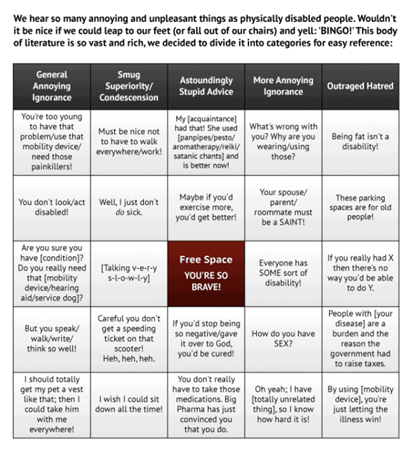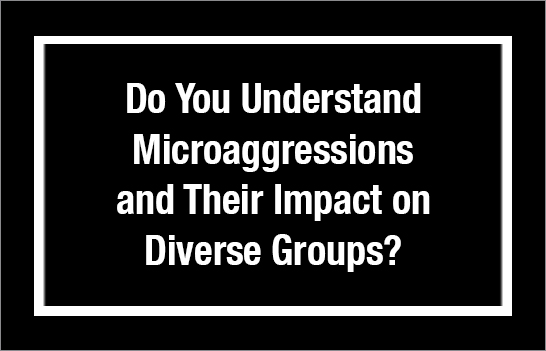Do You Understand Microaggressions and Their Impact on Diverse Groups?
By Gina Rubel
Today’s definition of microaggression is credited to Derald Wing Sue, a professor of counseling psychology at Columbia University. Since 2007, he has written several books on microaggressions, including “Microaggressions in Everyday Life: Race, Gender, and Sexual Orientation.”
Sue says that microaggressions are the everyday slights, indignities, put-downs and insults that members of marginalized groups experience in their day-to-day interactions with individuals who are often unaware that they have engaged in an offensive or demeaning way.
The Facts About Microaggressions
Microaggression is a term used to describe casual, daily types of comments or statements that intentionally or unintentionally reflect implicit biases against specific groups.
- Microaggressions may seem innocent or harmless but they impact the receiver or groups of receivers negatively.
- Microaggressions are the lived experience of a group of people — the daily, small bits of drama that take place overtly or inadvertently.
- Microaggressions reflect beliefs that have been so engrained in us that we often don’t recognize the impact of the behavior on others. Whether done innocently or out of willful ignorance, the behavior is harmful, nonetheless.
- Microaggressions cause systematic, sustained trauma.
- Microaggressions happen all day, every day, everywhere and in every context.
In an interview by Law.com, ‘For White People’: Watch the Video as Black Lawyers Open Up About Microaggressions, Loreal A. Arscott, an African American woman lawyer from Florida said, “When we talk about implicit bias, we are talking about microaggressions. When we talk about ‘dog whistle politics,’ we are talking about microaggressions. The resurgence of the Black Lives Matter movement is just pushing this concept to the forefront, but this is not a novel concept. There is nothing new under the sun. We need to discuss this. Tackle it. Kill it so we don’t have to discuss it any longer.” I agree, and I encourage everyone to watch this video, which is raw and painful.
Examples of Microaggressions
Offensive to people of Asian descent:
- Saying, “Open the Kimono.”
- Stating or referring to all Asians as being smart.
- Referring to Asians as “Orientals.”
- Referring to COVID-19 as the Kung Flu, China virus, Chinese virus, or Wuhan virus.
Statements offensive to Black and brown people:
- You speak so well. You don’t sound Black.
- You’re the first Black person I have known who [insert anything here].
- Race isn’t an issue.
- I don’t see color.
- There is only one race, the human race.
- You don’t sound urban.
- How often do you wash your hair?
- Are you wearing your hair like that for work?
Microaggressions against people with disabilities and special needs:
Content on microaggressions against people with disabilities and special needs was overlooked by me in the original draft of this post, not because I chose to overlook it; I didn’t think of it. Shame on me for not doing so and thank you to the reader who brought it to my attention. I have several family members and friends with disabilities and special needs from my cousin, Scott Fedor, who is a quadriplegic as a result of a diving accident, a friend whose daughter had Down syndrome, another friend who has two blind sons, a family member with COPD, and a cousin who Charcot-Marie-Tooth disease (CMT), and many others. I recall vividly the way people reacted to my cousin who we pushed around Italy in a wheelchair. In fact, while I love Italy and the Italian people deeply, their lack of support and resources for people with disabilities and special needs is appalling. There was one day when we were in Rome where I stood in the middle of the crosswalk, put my hand up in both directions to stop traffic, and made it safe for my cousin to cross in her wheelchair. I was lucky not to get run over by a Vespa, and I don’t recommend my antics to others, but it was the only way we were going to get her safely across the street. So here are some of the microaggressions against people with disabilities and special needs that we all must be aware of.
Offensive statements include:
- Can I pray for you?
- Have you tried X (to solve a disability)?
- Don’t you miss X (something one assumes you may have been able to do previously)?
- Disability isn’t part of diversity.
- Saying “great job” in a patronizing tone.
- You’re so brave.
I found this chart on A Day in Our Shoes website: 39 Ableist Microaggressions You Might Encounter At An IEP Meeting | Think Before You Speak!

Statements offensive to immigrants and people with accents:
- Your English is flawless.
- Where are you from?
- Where are your people from?
- Where were you born?
- Where is your country?
- How long have you been in America?
- How did you get here (referring to America)?
- Is your family in America too?
- Do you go back to your country?
Offensive to Jewish people:
- Telling people they should get a Jewish lawyer.
- Referring to someone as a JAP or Jewish mother.
- Stating that one is not antisemitic because they have Jewish friends.
- Use of the words or terms: Jewing, Jewing down, Jewed down.
Offensive to LGBTQIA+ individuals:
- Stating that the use of personal pronouns is silly.
- Stating that there are only males and females.
- Stating that marriage is only valid between a man and a woman.
- Saying, “It’s so gay that [insert anything here].”
- Using the phrase, “Just us girls” or “Just us guys.”
Statements offensive to older individuals:
- You are so cute.
- Are you sure you should be doing that?
- I would never have guessed you’re that old.
Read: Is Ageism One of the Last Socially Accepted Prejudices?
Statements offensive to women:
- Do you work?
- Are you a stay-at-home mom?
- Are you a nurse or schoolteacher?
- Oh, you must be Mrs. [man’s last name].
- I didn’t know girls [played rugby, wrestled, played football, played hockey ….]
- Girls aren’t good at [insert anything here].
- Are you his assistant?
- Who wears the pants in the house?
- Women should be barefoot and pregnant.
- There’s no place for women in [insert anything here].
Statements offensive to one who wears traditional, cultural or religious garments such as a Kente, Sari, Kimono, Hijab, Turban, Kippah, or Burqa:
- Why do you wear that?
- Isn’t that uncomfortable?
- Why are your clothes so bright (or dark)?
- You’re always dressed like you’re going to a funeral.
I’d be remiss if I didn’t share some of the microaggressions that I’ve experienced as an Italian-American, even though I am a white woman who was born in the United States. These are just a few that I can recall.
- “You’re Italian. You have child-bearing hips.”
- “What do you mean you never watched The Sopranos? I thought you’d love it, being Italian.”
- “Do you know John Gotti, boom boom?” – asked of me when I was visiting Paris at age 27.
- “You must love to eat pasta.” I do, but I avoid it most of the time because of the carbs.
- “The Godfather must be your favorite movie.”
- “How many people in your family are named Vinny?”
- “That’s such a Guido thing to do,” — said in general, not referring to my grandfather.
In an article in CBE Life Sciences Education (published by The American Society for Cell Biology) entitled Language Matters: Considering Microaggressions in Science, Collin Harrison and Kimberly D. Tanner said it best:
“Language matters. What we say can have profound effects on an individual’s sense of belonging, self-efficacy, and science identity. …We can ourselves use language that may slight or invalidate someone else, even with only the best of intentions. We all make mistakes and may lack awareness of the way our words may affect those around us. We also all have unconscious biases that influence how we interact with one another. While we may or may not be aware of, or effectively address, biases, they are a part of everyday life for nearly all humans.”
Additional Microaggression Resources
Examining our own implicit and unconscious biases can be a difficult thing to do, but we are all the better for it when we do. Further reading and thoughtful guidance can be found in these resources, which we at Furia Rubel have found useful:
American Psychological Association, How to Confront Microaggressions: Did you really just say that?
The New York Times, How to Respond to Microaggressions
Harvard Business Review, When and How to Respond to Microaggressions
NPR, Microaggressions Are a Big Deal: How To Talk Them Out and When to Walk Away
University of Minnesota, School of Public Health, Examples of Microaggressions
University of Mississippi, Language as Microaggression: The New Lexicon of American Racism
University of South Carolina, Aiken, Department of Diversity Initiatives, Inclusive Language Guide
Yale Law Journal, Law As Microaggression
